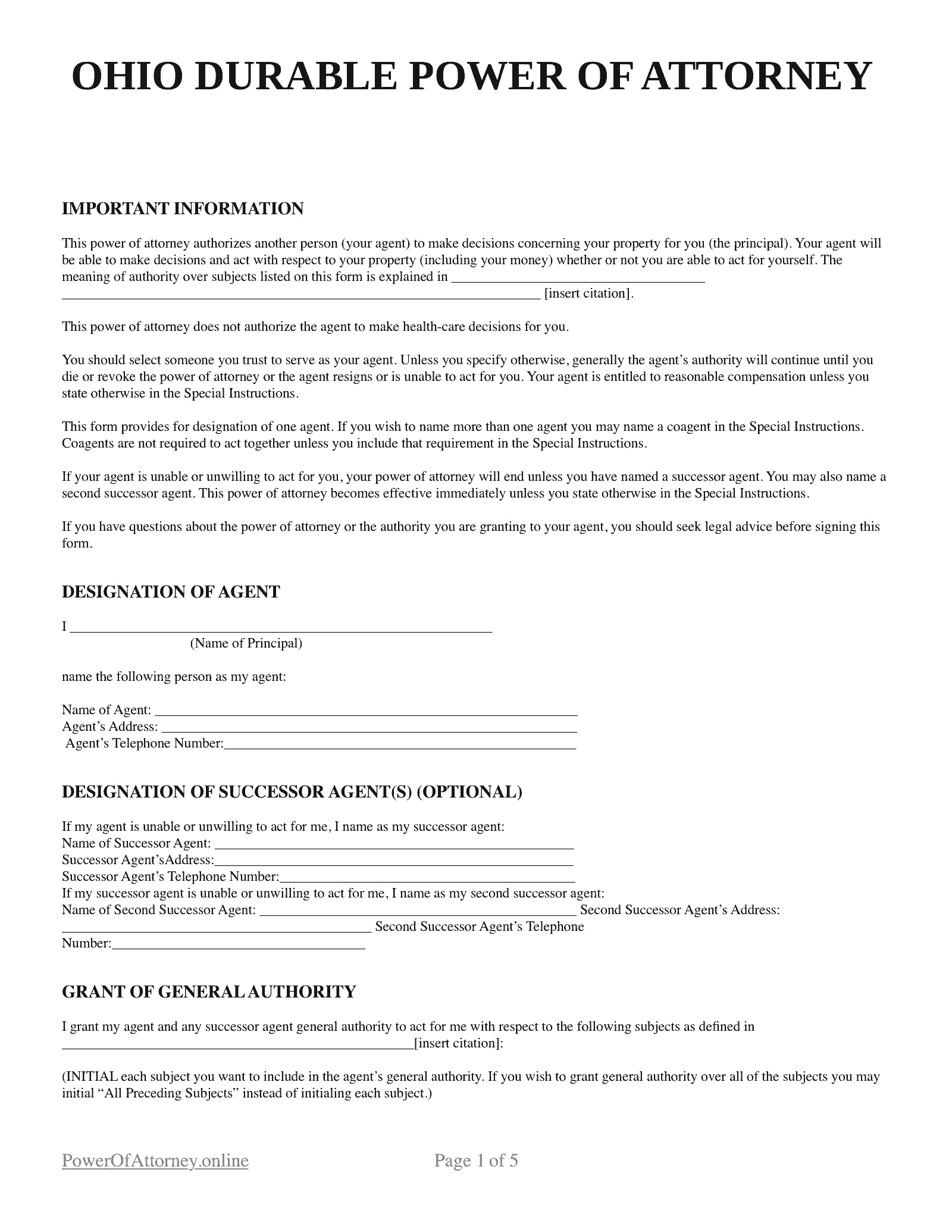Free Ohio Durable Power of Attorney Forms
A durable power of attorney (POA) is a document that grants authority to a person (agent) to act on behalf of another (principal). Unlike other POAs, it remains in effect even when the principal becomes incapacitated.
This essential document prevents the interruption of financial, medical, and other legal matters.

Ohio Durable Power of Attorney Laws
POA matters in Ohio follow the Ohio Revised Code Title 13 Chapter 1337. Here are some relevant points:
- Agent definition - According to the law, an agent is “a person granted authority to act for a principal under a power of attorney, whether denominated an agent, attorney in fact or otherwise. ‘Agent’ includes an original agent, coagent, successor agent, and a person to whom an agent's authority is delegated. (Ohio Revised Code § 1337.22).”
- General provision - A durable POA remains in effect even after a person’s incapacity “unless it expressly provides that it is terminated by the incapacity of the principal” (Revised Code § 1337.24). A principal is considered incompetent when they have an impairment, or they are missing, detained, or outside the country and unable to return.
Signing Requirements in Ohio
We have printable Ohio durable POAs online for your convenience. When satisfied with the contents, you can sign the form.
According to Ohio law, “A power of attorney must be signed by the principal or in the principal's conscious presence by another individual directed by the principal to sign the principal's name on the power of attorney. A signature on a power of attorney is presumed to be genuine if the principal acknowledges the signature before a notary public or other individual authorized by law to take acknowledgments” (2013 Revised Code § 1337.25).
How To Write a Durable POA in Ohio
If you are unable to sign documents or implement your decisions on financial, medical, legal, and other business matters, a durable POA will help ensure that there will be no interruption in your activities.
Here are the important steps for creating a durable POA in Ohio:
1. Find someone you can trust to be your agent
An agent acts on your behalf in matters involving your finances and health. As such, it is a very important duty and must be granted to someone who has your best interests in mind. Find someone you can trust with your life and money, and ask them to be your agent. Most people choose close family members.
2. Discuss the responsibilities with your agent
Talk to your agent about what you want them to do. Be as specific as possible—clarifying your preferences will benefit you both. Your wishes are granted, and your agent has an easier time making decisions because they know what you would have wanted.
Healthcare decisions are especially challenging. When the principal becomes incapacitated, the agent must sign on to medical procedures and interventions moving forward. In the worst-case scenario, the agent may have to make end-of-life decisions.
3. Download an Ohio durable POA template
For your convenience, download a template online. Make sure the form follows the proper format according to Ohio laws. Complete the form and fill out the spaces for your names, the specific responsibilities, and when the document will become effective. Outline all the duties you want your agent to fulfill.
4. Sign the form
Once completed, sign the Ohio durable POA in front of a notary public.
5. Start using the POA
Keep a copy of the POA and give one to your agent, attorney, and other close family members. The agent will need to present the POA each time they make a decision on your behalf.